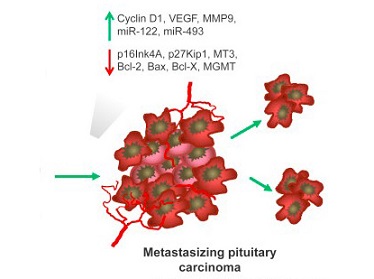BREAKING COVID-19 News! Doctors In Thailand Warn That COVID-19 Vaccines Could Possibly Lead To Tumor Expansion In Certain Cancers!
Nikhil Prasad Fact checked by:Thailand Medical News Team Jan 25, 2024 1 year, 11 months, 3 weeks, 6 days, 9 hours, 13 minutes ago
COVID-19 News: In a recent development that has sparked conversations within the medical community, Thai doctors from the Phramongkutklao Hospital in Bangkok have brought attention to a possible correlation between COVID-19 vaccines and the enlargement of pituitary adenomas. This revelation stems from a compelling case involving a 60-year-old woman who, after receiving her fourth dose of the Pfizer-BioNTech COVID-19 vaccine, experienced visual loss in her left eye. This
COVID-19 News report delves deeper into the intricacies of this case, shedding light on the broader implications and the pressing need for extensive research to understand the potential impact of COVID-19 vaccines on the endocrine system.
 COVID-19 Vaccines Could Possibly Lead To Tumor Expansion In Certain Cancers
Understanding Pituitary Adenomas
COVID-19 Vaccines Could Possibly Lead To Tumor Expansion In Certain Cancers
Understanding Pituitary Adenomas
Pituitary adenomas, characterized as slow-growing, benign tumors within the pituitary gland, are known for their indolent nature. These tumors can either be functioning, secreting hormones, or non-functioning, causing compression on adjacent structures. Despite their prevalence ranging from 3.9 to 7.4 cases per 100,000 per year, identifying specific factors contributing to their growth remains a challenging task.
COVID-19 and Endocrine Disruptions
The relationship between COVID-19 and the endocrine system has been a subject of growing interest among researchers. COVID-19 infections have been associated with disruptions in glucose regulation, thyroid dysfunction, adrenal insufficiency, and alterations in the hypothalamic-pituitary axis. The impact of COVID-19 vaccines on the endocrine system is an emerging area of study, with sporadic reports linking vaccines to transient complications such as thyroiditis, pancreatitis, and, notably, pituitary gland enlargement.
The Case Presentation
The pivotal case under discussion involves a 60-year-old woman who, within three days of receiving her fourth COVID-19 vaccine dose, experienced sudden visual loss in her left eye. Neuroimaging revealed a pituitary macroadenoma exerting pressure on the optic chiasm, prompting the medical team to explore the potential connection between the vaccine and the observed pituitary gland enlargement. Subsequent investigations confirmed a non-functioning pituitary tumor, adding a layer of complexity to the scenario.
Discussion on Vaccine-Induced Effects
This case serves as a poignant example of a unique manifestation of pituitary gland enlargement following COVID-19 vaccination. While the majority of pituitary adenomas remain asymptomatic, the patient's subacute visual impairment and associated symptoms post-vaccination underscore a potential association. Existing literature has previously documented vaccine-induced effects on the pituitary gland, such as pituitary apoplexy and hypophysitis. However, the exact mechanisms linking vaccination to pituitary gland disorders are not fully understood.
Pathophysiological Mechanisms
g>
To comprehend the potential link between COVID-19 vaccines and pituitary adenoma expansion, it is crucial to delve into the underlying pathophysiological mechanisms. One hypothesis suggests that the pituitary gland may serve as a target for the virus due to the presence of angiotensin-converting enzyme-2 (ACE-2) receptors on pituitary cells. The vaccine-induced inflammatory or immune responses could trigger endothelial dysfunction, leading to increased permeability and subsequent edema in the delicate vascular network within the pituitary gland.
Clinical Implications and Challenges
The case underscores the importance of clinical suspicion, especially in instances where visual fields appear stable over time. The subtle clues, such as temporal pallor of the optic disc, highlight the need for heightened awareness among clinicians to promptly identify potential underlying pathology. As the COVID-19 vaccine continues to play a crucial role in preventing severe outcomes, individuals must be informed about potential side effects, particularly those impacting the endocrine system.
Conclusion
In conclusion, the Thai doctors' case report has ignited a broader conversation about the potential association between COVID-19 vaccines and the expansion of pituitary adenomas. While these tumors are typically slow-growing and asymptomatic, the observed vaccine-induced effects in this case warrant further exploration. Ongoing research is imperative to unravel the intricate relationship between COVID-19 vaccines and pituitary gland disorders fully. Individuals with preexisting pituitary adenomas should remain vigilant about potential vaccine-related side effects and seek prompt medical attention in case of serious adverse events. As the scientific community continues to navigate the complexities of the COVID-19 pandemic, continuous research and vigilance are essential to ensure the safety and efficacy of vaccination programs worldwide.
The case report was published in the peer reviewed journal: Cureus.
https://www.cureus.com/articles/202593-covid-19-vaccine-induced-expansion-of-pituitary-adenoma-a-case-report#!/
For the latest COVID-19 News, keep on logging to Thailand Medical News.
